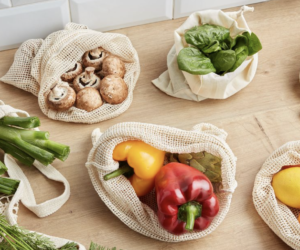
“I’m on a high-fat diet – I’ve cut carbs.” “I’m starting a juice cleanse next week.” “I can’t go to lunch, I’m fasting today.” Our water cooler conversations and Facebook feeds are awash with misinformation about food. Nutrition science is rarely simple, and most listicles and infographics leave little room for nuance. A few myths, though, are decidedly busted:
Products marketed as “low fat” or “fat-free” are healthier choices.
Not necessarily. Low-fat versions of your favorite products, like peanut butter, may contain more sugar or sodium to make up for the flavor lost with a lowered fat content. The next time you’re at the grocery store, compare nutrition labels between a product and its low-fat counterpart to see the difference.
Even so, fat isn’t as bad for you as a post-Atkins world may suggest. Not only can fat help you feel full for longer, your body needs it – fat protects your organs, maintains cell membranes, assists with brain function and helps your body absorb essential vitamins. However, know that you can consume fat responsibly by choosing unsaturated fats over saturated or trans fats. Go for olive oil, nuts and avocados rather than fatty meats and high-fat dairy products.
I need a detox!
Actually, you don’t – when they’re functioning at full capacity, your liver, kidneys and gastrointestinal tract are built-in detoxifiers. Instead of ordering an expensive juice cleanse, focus on eating whole foods like fruits and vegetables, staying away from processed foods and drinking more water. If you suspect you have health issues related to your kidneys, liver or GI tract, however, schedule an appointment with your doctor.
Avoid carbs for weight loss.
Unfortunately, there’s no quick fix for weight loss, and eliminating one food group won’t help. If you cut carbs drastically like keto dieters do, you may lose weight more quickly at first, but that’s mostly water weight. You’ll likely gain it back once you give up restrictive eating.
Most importantly, with a restrictive diet of any kind, you’re likely to miss out on some essential nutrients. Instead of cutting out a food group altogether, lean into healthier choices within that group. Limit overly processed carbs, but know that foods like beans and legumes, yogurt, fruit, vegetables and whole grains all contain carbs and they’re an essential part of any healthy diet. Remember that weight isn’t the be-all, end-all of health. An unsustainable restriction-based diet may complicate your relationship to food and lead to disordered eating behaviors down the road. It’s important to protect your mental health alongside your body.
Gluten-free anything is better for you.
Gluten is a protein found in wheat, barley and rye, but you only need to avoid it if you have celiac disease or another bona fide intolerance. Whole wheat products, which contain gluten, are actually a nutrition staple. They contain B vitamins and fiber, which promote the growth and maintenance of healthy gut bacteria and help you feel full for longer. If you follow a gluten-free plan for medical reasons, however, make sure your breads and other alternative products don’t contain any added sugar, salt or refined starches. As many companies do with fats, they may include these less-healthy additives to make up for the loss of flavor.

A calories-in, calories-out plan is all I need to lose weight.
Creating a calorie deficit is important when losing weight, but other hard-to-measure factors matter too. Hormonal imbalances, metabolic adaptations, the side effects of certain medications and genetic variables may make weight loss harder or easier depending on your own body chemistry.
Again, remember that weight isn’t the only marker of health, and sometimes eating more nutrient-dense foods means consuming more calories. Follow an eating plan you can actually sustain, with a healthy representation across food groups.
Fresh produce is more nutritious.
Fresh produce is delicious, but frozen contains just as many nutrients as fresh does – in fact, frozen fruits or vegetables are usually picked at peak times to maintain as many nutrients as possible. Canned goods are another great alternative to fresh produce, but check the nutrition label to see if they contain extra salt and sugar. At home, wash canned products off to get rid of excess sodium.
Your metabolism starts to slow down in your 30s.
Your body’s metabolism actually begins to slow starting in your 20s. You’ll burn an average of 150 less calories per day, due to your body’s shift in overall composition, to more fat and less muscle. This is why it’s extremely important to remain active, even for 15-30 minutes a day, because muscle burns more calories than fat. As they say, “when you rest, you rust,” so engage in a daily activity you enjoy to keep your muscles active longer and more efficiently.

When evaluating nutrition information, remember if it sounds too good to be true, it probably is. Better health starts with lifestyle changes that incorporate more whole foods and more movement, not a quick fix.
Take the first step.
Complete the form and one of our coaches will contact you to talk about your fat-loss goals and schedule your FREE workout!
No obligations, No pressure. Ever.
Try X-Force Body one time and you'll see why we're the ONLY choice for rapid, sustainable (and FUN) fat loss.
"I feel stronger. I sleep better. My eating habits have completely changed. I have a lot of energy. I was also taking thyroid medications when I started. Since then, I'm down to half of the medications I was taking." *
Maria Torri, Palm Harbor
Attend an upcoming Discovery Session and learn more about the X-Force Body Program!
Who’s X-Force Body?
Recent Posts
- Fat Loss For A Leaner YOU March 15, 2024
- Fit After 40: Yes You Can! February 16, 2024
- Strength Training: The Key to Defying Diabetes January 3, 2024
- Fight The Fatigue November 16, 2023
- Don’t Skip The Weights October 17, 2023



